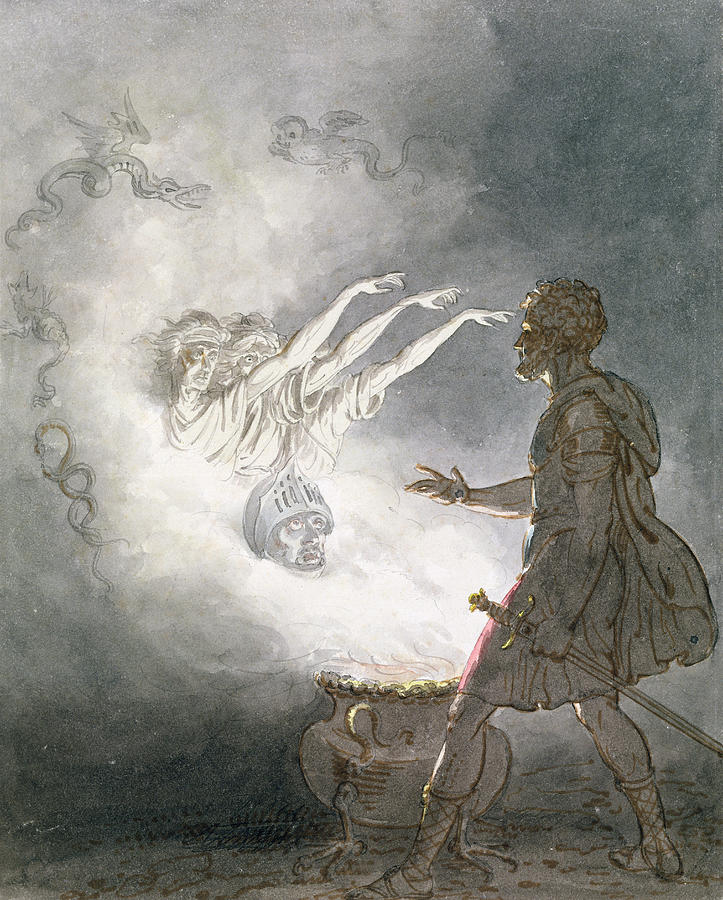
Macbeth boldly replies that he wants to see the masters.

The Witches tell Macbeth that they will answer his questions, and ask if he would like to hear the answers from them or from their masters. In short, Macbeth wants his answers, even if the whole world goes to hell. "Nature's germains" are the seeds of all nature (we might call them "the building blocks of life"), and "destruction" is imagined as a person who would destroy so much that he would become sick of himself. He wants answers, even if it means that winds knock down churches, waves swallow ships, crops are lost, or "though the treasure / Of nature's germains tumble all together, / Even till destruction sicken" (4.1.58-60). What they "profess" are the arts of black magic, but Macbeth cares about nothing except himself. He immediately demands that they answer his questions, saying "I conjure you, by that which you profess, / Howe'er you come to know it, answer me" (4.1.50-51).

He asks them what they're doing, and they answer mysteriously, "A deed without a name" (4.1.49), but Macbeth doesn't seem to be listening. It seems that the cave has a door, and that the door opens by Witches' magic, because when Second Witch says, "Open, locks, / Whoever knocks!" (4.1.47), in comes Macbeth. All editors agree that Shakespeare never intended for Hecate or her song to get into his play, which is a good thing, because her song is pretty boring.) Now the Witches are ready for Macbeth, and the Second Witch, sensing his approach, says, "By the pricking of my thumbs, / Something wicked this way comes" (4.1.45). (At this point, Hecate enters, to congratulate the witches on their work, and to lead them in a song which we know was not written by Shakespeare. This should remind us that these Witches are not cute old ladies in pointy hats.įinally, the mixture in the cauldron is cooled with "baboon's blood, / Then the charm is firm and good" (4.1.37-38). A "drab" is a prostitute, and in the real world of Shakespeare's time it did happen that prostitutes, with no money, no family, and no friends, delivered their babies in hiding, then killed and disposed of them. It's as though the witches had gone dumpster-diving at some ghastly slaughter house.Īfter this, the stew gets ever more foul as human parts start to go into the pot, the last one being, "Finger of birth-strangled babe / Ditch-deliver'd by a drab" (4.1.31). After that, the ingredients are all mutilated body parts, beginning with "Fillet of a fenny snake" (4.1.12), and including "Lizard's leg and owlet's wing" (4.1.17). First there's a toad, chosen because it has been sweating poison for a month. Now the Witches chant about what they are putting into the cauldron to make the magic potion. A hedgehog has spoken to the Second Witch, and the Third Witch is taking orders from "Harpier" (4.1.3), whose name suggests "harpy," which is a disgusting monster with the head of a woman and the wings, feet, and claws of a bird of prey. As another reminder that they are acting at the behest of evil powers, they tell each other about the voices they are hearing, beginning with First Witch crying, "Thrice the brinded cat hath mew'd" (4.1.1). Thunder announces the entrance of the Witches. As for the cauldron, the Witches chant of making a sickening stew in a cauldron, and it would seem right for the Witches' apparitions to rise like steam out of that stew. A cave is a dark place that could remind us of hell, and the Witches certainly intend to summon up the powers of hell. That's reasonable, even though Shakespeare didn't write any such stage direction. Most editions of Macbeth say that this scene takes place in a cave, around a boiling cauldron. The Witches vanish and Macbeth calls in Lennox, who tells him that Macduff has fled to England, whereupon Macbeth determines to murder Macduff's wife and children.

The witches call up apparitions which give Macbeth warnings, promises, and prophecies: beware Macduff fear "none of woman born" fear nothing until Birnam wood come to Dunsinane Banquo's issue shall be kings. ≼hanting "Double, double, toil and trouble," the three Witches stir the cauldron. Detailed Summary of Macbeth, Act 4, Scene 1


 0 kommentar(er)
0 kommentar(er)
